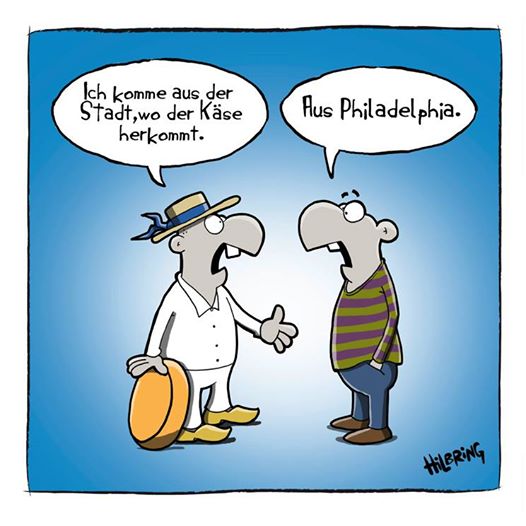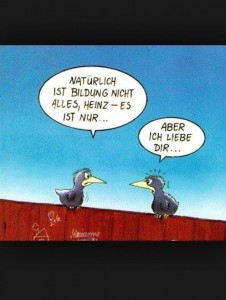German Jokes
Learn German with Jokes

German Jokes are a good way to learn German with. Germans are known for their overly serious attitude and their proverbial lack of humour. German jokes are notoriously unfunny–at least according to cliché. The most common German jokes actually reveal a humour that can be quite dark, and Germans also poke fun at each
other, even themselves. Short jokes with a pun in German can be witty and often feature an elaborate play on words, but translated into English, these lose their punch lines. To fully get German humour and jokes, you have to learn the language. We’ll introduce you to common types of funny German jokes to keep you motivated and
present you with the best and worst of German jokes! Of course, we will also provide you with those German jokes in English.
The best and worst German jokes

German humour: the most common types of German jokes
-
Making fun of other Germans
In many countries, people will target their fellow citizens from a different region or ethnic background with jokes, commonly calling them stupid, slow, or weird. In Germany, people from East Frisia, Saxony, Bavaria or Berlin are typically the butt of these jokes. After the German reunification, a new category of jokes arose to highlight the remaining difference between East Germans (Ossis) and West Germans (Wessis).
Was ist der Unterschied zwischen einem Saxen und einem Ausländer? Den Ausländer versteht man, wenn er Deutsch spricht. –What is the difference between a Saxon and a foreigner? You’ll understand the foreigner when he speaks German.
-
Mami and Papi Witze: jokes including Mum and Dad
These jokes feature a short interaction between a child addressing either Mum or Dad with “Mami, Mami” or “Papi, Papi” and a question or observation. The punchline is always in the retort of the respective parent, often giving it a cruel or unfortunate twist.
“Mami, Mami, ich will nicht in die USA!” – “Sei ruhig und schwimm weiter.” – “Mummy, mummy, I don’t want to go to the USA!” – “Shut up and keep swimming.”
-
Fritzchen-Witze: jokes including little Fritz
If you’ve heard jokes with Little Johnny in English, you’ll get the gist of German jokes about Little Fritz, or Fritzchen. This fictional boy is a mischievous character who is more witty than bright. He’s not always the butt of the joke, as he often has clever comebacks to questions from his teacher or his parents.
Lehrer: “Wo wurde der Friedensvertrag von 1806 unterschrieben?”
Fritzchen: “Unten rechts?”
Teacher: “Where was the peace treaty of 1806 signed?”
Little Fritz: “Bottom right?”
Alle Kinder: jokes including all children
“Alle Kinder” jokes feature a rhyme and are therefore difficult to translate which is a good example that not all German jokes work in English. The setup and structure of these jokes are always the same: all children are doing something, only one kid is singled out, then the punch line has to rhyme with that kid’s name. The humour is typically dark, resulting in a bad fate for that one child.
Alle Kinder bleiben am Abgrund stehen, nur nicht Peter, der läuft noch‘n Meter. – All children stop before the gorge, only Peter walks another metre.
Bauernregeln: farmers’ lore
Traditionally, “Bauernregeln” were lore passed on by farmers in rhyme and often concerned a fact about the weather. Today, these jokes not only poke fun at farmers in other ways, but they can also be about anything as long as they feature the same rhyming pattern.
Trinkt der Bauer und fährt Traktor, wird er zum Gefahrenfaktor. – If the farmer drinks and rides his tractor, he becomes a danger factor.
Willst Du Dir den Tag versauen, musst Du in den Spiegel schauen. – To ruin your day, look in the mirror.
Kalauer & Flachwitze: German puns
There are many other names in German for this kind of joke, but “Flachwitze” or “Plattwitze”, all denote the same thing: a short joke with a pun as a punchline that will usually make you groan more or less hard. The term “Kalauer” is said to come from the German city of Calau. From 1848 to 1944, a satire magazine published there featured weekly “news from Kalau” with this kind of jokes. Commonly, “Kalauer” jokes require a deeper understanding of the German language, culture, or both. Here are two which (kind of) work in English as well:
Was sagt ein Krokodil, das einen Clown gefressen hat? – Schmeckt komisch! – What does a crocodile say after having eaten a clown? – Tastes funny!
Mann auf dem Markt: “Zwei Pfund Tomaten, bitte.”
Bauer: “Das heißt Kilo.”
Mann: “Seit wann denn nicht mehr Tomaten?”
Customer at the farmer’s market: “Two pounds of tomatoes, please.”
Farmer: “That’s called a kilo.”
Customer: “When did you stop calling it tomatoes?”
Antiwitze: anti jokes
These are similar to “Kalauer”, but instead of a pun, they have an absurd punchline. The element of surprising the listener is more important than making them laugh. In essence, these jokes are so stupid you’re stumped.
Was ist der Unterschied zwischen einem Storch? – Beide Beine sind gleich lang, besonders aber das linke. – What’s the difference between a stork? – Both legs are the same length, especially the left one.
Zwei Männer gehen durch die Wüste. Sagt der eine: “Lass mich mal in die Mitte.” – Two men are walking through the desert. Says one: “Now let me walk in the middle.”
Scherzfragen and more German jokes
German humour also features many elements that exist in English or in other languages as well, such as dad jokes (groaners), “Deine Mutter Witze” (your mother jokes), jokes about (German) politicians, celebrities and public figures, and “Scherzfragen”. These are a special kind of questions that seem like a riddle, but the obvious answer is poking fun at the person who has been asked.
Was passiert mit einem roten Stein der ins Schwarze Meer fällt? – Er wird nass. – What happens if you drop a red stone into the Black Sea? – It’ll get wet.
Funny German Jokes That’ll Crack You Up
Do you know any German jokes? There is a common stereotype that Germans are serious people and so do not have time for a good joke. German jokes derive their humor from wordplay, sentence construction, and the different pronunciations of certain words.
They will help you to better understand the jokes and even learn how to tell German jokes.

Best German Jokes
German jokes can be categorized depending on their content and to whom they are addressed.
-
Bauernregeln Witze
This is a classic type of German joke. It can be translated to mean farmer’s lore joke. They were often used to make fun of farmers. Usually, they have a bit of rhyme and express certain facts.
They are sometimes disguised as wise sayings but are mostly silly and meant to ridicule people and elicit laughter.
- “Wenn der Hahn kräht auf dem Mist, dann ändert sich das Wetter, oder es bleibt wie es ist”. . –If the rooster crows on a heap of dung, the weather will either change- or remain the same.
- “April und Weiberwill ändern sich schnell und viel.” . – April and women’s whims change quickly and often. This is meant to make fun of a moody girl or lady.
- “Wenn noch im November steht das Korn, dann isses wohl vergesse worn” . – If the corn in the farm still stands or is not harvested by November, there is something the farmer forgot to do.
- Liegt der Bauer tot im Zimmer, lebt er nimmer” . – If a farmer lies down dead in a room, he can’t live any more.
- “Trinkt der Bauer und fährt Traktor, wird er zum Gefahrenfaktor.” . – If a farmer is drinking while riding his tractor, he becomes a danger factor.
- [responsivevoice voice=”Deutsch Female” rate=”0.8″ buttontext=”Listen”]“Willst Du Dir den Tag versauen, musst Du in den Spiegel schauen.” [/responsivevoice]. – If you want to ruin your day, just look in the mirror.
Mantawitze
These are German jokes that ridicule Manta drivers. A Manta is a German sports car whose owners are perceived as dumb or obnoxious.
- Ein Mantafahrer hat auf seinem Beifahrersitz einen Papagei sitzen und das Fenster offen. Er hält an der roten Ampel neben einem Mercedes. Der Fahrer des Mercedes kurbelt sein Fenster ebenfalls runter und fragt: “Kann der auch sprechen?” Darauf der Papagei: “Weiß ich doch nicht!”
Translation: A Manta driver had a parrot in the passenger’s seat and his window open. He idled near a Mercedes at a red light. The driver of the Mercedes lowered his window and asked, “Can it talk?” Responded the parrot: “I don’t really know!”






























